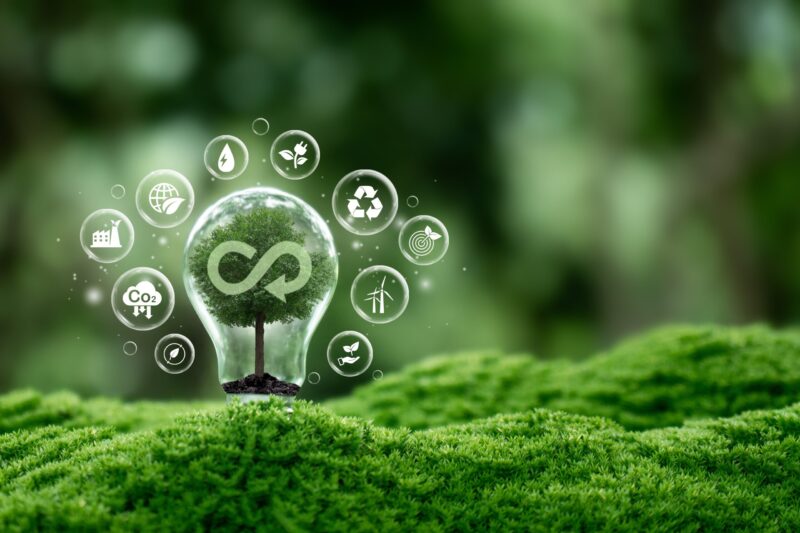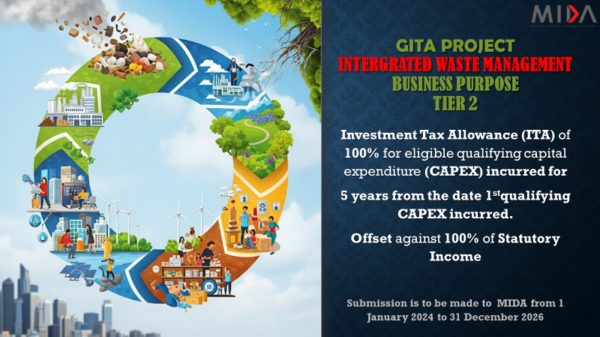
This site
is mobile
responsive

Malaysia generates an estimated 39,000 tonnes of solid waste every day—the equivalent of filling almost 3,000 garbage trucks daily. With a growing population, rapid urbanisation, and expanding economic activities, this figure is set to rise, with the waste management sector as the second biggest contributor to national greenhouse gas (GHG) emissions.
For decades, the nation has relied on the conventional “take, make, manage, dispose” model. While this linear system drove economic growth in the past, it has also left a legacy of overflowing landfills, wasted resources, and widespread pollution. Today, landfills remain the dominant disposal method, and many are already reaching capacity.
But a shift is underway. The Circular Economy (CE) presents Malaysia with a compelling opportunity to reimagine waste as a valuable resource. This model extends the lifecycle of materials, reduces environmental harm, and supports innovation across industries. By adopting CE principles, Malaysia can align economic progress with sustainability, reduce greenhouse gas emissions, and position itself as a regional leader in green growth.
The Circular Economy Blueprint for Solid Waste (2025–2035) defines CE as the reuse, recycling, upcycling, and repurposing of materials to minimise environmental pollution, conserve natural resources, and generate economic value. Unlike the linear economy, CE focuses on “closing the loop” by ensuring that materials remain in circulation for as long as possible.
Initially centred on the 3Rs (Reduce, Reuse, Recycle), the framework has evolved into a more comprehensive 9Rs:
This holistic approach embeds sustainability into production, consumption, and waste management, ensuring long-term efficiency and resilience.
Adopting CE is timely as Malaysia navigates key waste management challenges:
These realities make a strong case for CE, not only as an environmental solution, but also as an economic and social imperative.

The adoption of circular principles carries wide-ranging implications:

Malaysia has taken meaningful steps to institutionalise CE principles across multiple sectors:
Solid Waste Management Policies
Manufacturing Sector Initiatives
National Development Plans
These frameworks signal Malaysia’s strong commitment to embedding circularity in both industry and society.
Malaysia can also draw lessons from global leaders in CE:
By adopting and adapting such best practices, Malaysia can accelerate its own transition.
Malaysia’s waste management policy framework is designed to foster a competitive investment environment, aligning with global decarbonisation and sustainability trends.
Green Investment Tax Allowance (GITA) – Tier 2
Introduced in Budget 2023, this incentive provides fiscal support for waste management projects:
As at June 2025, the integrated waste management and recycling sector attracted RM22.7 billion in investments, including RM3.2 billion from 17 approved Integrated Waste Management (IWM) projects. This reflects Malaysia’s proven ability to create a business environment where sustainability and profitability go hand in hand.
The road toward circularity requires innovation, collaboration, and public participation. For Malaysia, the priorities ahead include:
As the Government’s principal investment promotion agency, MIDA remains committed to facilitating high-value, technology-driven investments that support Malaysia’s transition to a circular economy.
Embracing CE is not only about solving waste challenges—it is about building resilience, creating jobs, and ensuring Malaysia’s economic competitiveness in a low-carbon future. Together, with strong policy support and private sector innovation, Malaysia can transform today’s waste into tomorrow’s opportunity, ensuring a cleaner, greener, and more prosperous future for all.
For more information, please contact the Green Technology Division, MIDA at https://www.mida.gov.my/staffdirectory/green-technology-division/
